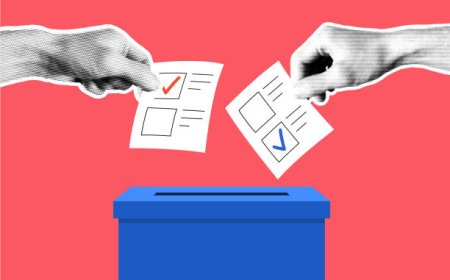The Political Landscape Facing BNP
The BNP has an opportunity now to define itself and set the direction of the country for years to come. But it must present itself as the party of the ordinary Bangladeshi, and especially those from 35-60 who will shape the country's immediate future.

Every political party in the world has a trust deficit, and the BNP is no exception. The people of Bangladesh, especially those in urban areas, are struggling to trust the BNP. While many of the causes for this trust deficit are beyond the BNP's control, the problem is that the party isn't addressing these issues.
A Rightist Country
At least 80% of Bangladesh's population is arguably on the political spectrum from center-right to far-right. The entire country is arguably right-leaning. But what are their rightist values? I argue that the vast number of people only truly subscribe to two right-wing values: a strong affinity for Islam and an anti-Indian sentiment.
The anti-Indian sentiment is understandable. India's Hindu-nationalist government and its majority population are so Islamophobic and against Bangladesh's interests that any normal person in Bangladesh would naturally be anti-Indian. For 15 years, the Indian government had continuously supported a corrupt regime. The people of Bangladesh have not forgotten this insult, and there's no reason they should anytime soon.
However, the affinity for Islam among Bangladeshis is difficult to explain. Even the most morally corrupt individuals in this country display a closeness to Islam, and the general public happily accepts it. If you can use "I'm with the Islamic side" as a virtue signal without actually following the values of Islam in your own life, you'll be respected in society. You can even do this if you're not a Muslim.
This "Islam without the fear or burden of Allah" is a bizarre phenomenon. I say this with full awareness that a significant number of people in Bangladesh knowingly and deliberately lie for political and party gain. At least 95% of this country's Islamists (and a large number of Muslims) quite likely believe that "the end justifies the means," which Islam absolutely does not condone.
This is the boundary of the political beliefs of the center-right to right-wing people of Bangladesh.
The Over-sized Party and Its Consequences
The biggest political disaster for the BNP in this landscape has been its overnight bloating since August of last year. Although everyone in the party is happy about it, it's actually a disaster. No institution in Bangladesh should become over-sized. It's ruinous because the aspirations of the Bangladeshi people have no grammar.
This over-sizing may not be reflected on the social media, but everywhere else, everyone is BNP. Yet, social media is where the BNP needs to have the strongest presence. The problem is, being over-sized prevents the BNP from giving a coherent message. Everyone says something different and sends a different message.
Every political party in the world must have an open door so that anyone can enter. That's just the nature of political parties. The same is true for a mosque's front door; it's open to all Muslims. The problem is that in a mosque, people also leave after half an hour. Nobody leaves through the front door of a political party. This open door has let in all sorts of people into BNP, professionals as well as thieves and scoundrels. No political party in the world can ever prevent this. It's not a school where you pass from one grade to the next. But people read the soft "act" of entering as a political signal.
The Struggle of a Centrist Party
The BNP is a centrist political party. A centrist political party can never win an ideological debate because there is social pressure to consider the middle ground as "without a vision."
Suppose the message is: "The law should be allowed to take its course; I'm a person who supports due process." Is this really reassuring in Bangladesh? Chances are that most people would be excited to hear: "To hell with the law. If someone rapes, their genitals should be cut off. Hack them off! Pfft!"
This is because many Bangladeshis are angry, and one doesn't have the ability to think about consequences with a cool head when angry. When you ask: "Who will do the hacking? What will be the punishment for the person who hacks off the wrong person’s private parts? Is there a guarantee that the people who do the hacking won't desecrate graves?" -- you’ll be laughed off.
The Path to Victory and Representation
The BNP will win lot of votes but will never win a battle of ideologies, whether it's related to 1971, 2024, or Islam. Its only path to victory is good governance and economic recovery. How will they do in that area?
Well, good governance can't be judged unless they come to power. So, there's no point in discussing that for now. I've heard that the BNP is doing a lot of work for economic recovery. Hopefully we will hear about that soon.
The real problem, however, is the BNP's representation. Different people represent the BNP in different ways, and there's no coherence in their beliefs. The most far-right person in Bangladesh wonders why the BNP isn't more right-wing, and the person on the left wonders why the BNP isn't more liberal. But neither of them will vote for or own the BNP. Surprisingly, there are many people in the BNP who listen to and value the opinions of the far-right and far-left, who will never vote for the party themselves.
A low-income person in the city sees that many BNP members extort money. In their eyes, that extortionist represents the BNP. That low-income person doesn't understand how many people have been expelled by the party. The BNP top leadership's intentions are good, and they are trying. I agree. But there are many areas of life where honest effort isn't enough!
Many capable professionals in the 35-60 age group like the BNP and may even vote for them, but they don't own the BNP. The BNP has failed to create even five national leaders from this entire generation. Yet, this is the generation that will work in the future. This failure is 100% the BNP's. They don't give new people a break because the BNP practices old-school politics. The mentality is, "You come to me, you provide a service," which is not how politics works today. The BNP's top leadership needs to be able to hunt for talent, and this is doable.
The BNP needs to reach out to professionals and young people. This is the BNP's biggest problem. Everyone in this party wants to be a big leader, an MP. Nobody wants to do the groundwork. Many promising young people want to help the BNP, but they complain that they can't get into the inner circle. Newcomers have no entry into important political decisions within the BNP, and women have none at all. I have heard this complaint from a great many leaders. Young people don't all want opportunities; they want respect and purpose.
The Need for Generational Transition
If you're a 40-year-old highly competent professional who wants to join the BNP, and you don't have relatives or a very close "older brother" in the party, it's difficult to get in. I'm not saying that anyone who enters should be made an MP or given a position, but it's very difficult to get in at the upper levels for meaningful work.
Tarique Rahman can provide proof that the BNP is interested in solving people's problems by bringing in competent professionals. In the upcoming election, the BNP is going to get an opportunity that few political parties ever get. They can bring at least 30 highly competent people into politics. Khaleda Zia did not have the luxury to take this risk. Ziaur Rahman had it, and Tarique Rahman is getting it this time.
If the BNP misses this opportunity, there will be no generational transition in this party. At least not the transition that the party needs. Just as Ziaur Rahman hand-picked people, Tarique Rahman should also hand-pick them. The BNP will never get this opportunity again. The entire landscape will become competitive in the election five years from now. It will then be impossible to bring in new people.
When Ziaur Rahman brought Saifur Rahman into the BNP, did he know his loyalty, his position on the political spectrum, or whether he would be harmful to the BNP? No! He didn't know. But he knew that if he brought highly competent professionals into politics, they would do good things for the party and the country. At least five out of 10 would succeed. This has always been true.
Of course, not everyone has to be made an MP or minister, but BNP must give them responsibility, bring them into the fold. If the BNP cannot bring in the new middle class and young people, a generation will be effectively be disenfranchised because there is no other viable political option for a young professional right now.
For BNP, this is an opportunity, and also a responsibility.
The Need for a New Focus
The main problem in Bangladesh is youth unemployment, which is ultimately a security threat. After the mass uprising in Nepal, many of our revolutionaries became very emotional. They wanted to say that we needed to be more savage, like Nepal's Gen Z. But the promise of elections within six months on the very first day poured water on the eternal flame of the Bangladeshi revolutionaries.
The glaring similarity between the mass uprisings in Bangladesh and Nepal is youth unemployment. If this rate of unemployment persists, there will be extortion, law and order will not be maintained, and there will be mass unrest. It will happen again and again.
Yet, almost all of Bangladesh's political discourse is about secondary and tertiary issues like constitutional amendments, PR, RAW, elections, and the rise of right-wing politics. The entire country is caught up in partisan politics and self-interest. The ordinary problems of ordinary people are not important to them. The education system in this country is destroyed, and healthcare is more expensive than funeral services and not reliable.
Yet, people are obsessed with who took a picture with whom. In this country, it's a matter of pride to not see a future, to dwell on the past, and to equally doubt and hate everyone.
It is the BNP's responsibility to bring the national discourse back to real issues, a responsibility they are continuously failing to fulfill. The BNP's lifeline is good governance and economic recovery. They must prove that they are serious about this. They must tell the people what they will do if they come to power. They need prepare this nation, make them hopeful. They have to explain how BNP will deal with the interim government's main failure to reform the military and bureaucracy?
The message must be conveyed this message in all formats. The party must hire marketing professionals for good messaging. What you will do if you come to power is far more important than who will run for office.
Above all, Tarique Rahman should return to the country immediately. The country's readiness for an election will not kick-start until he returns to the country. The nonsense about PR will not end either. For this country to move to the next phase, his return is essential right now. He should visit every district and every constituency in the country. If he starts connecting with the common people instead of the urban elite and the "revolutionary masses," the tone of politics will change.
The BNP's focus should be on ordinary people and their problems.
What's Your Reaction?













































































